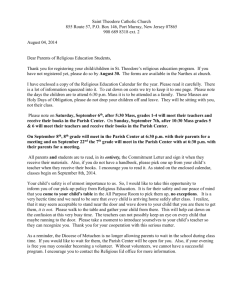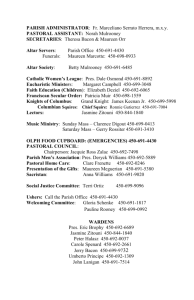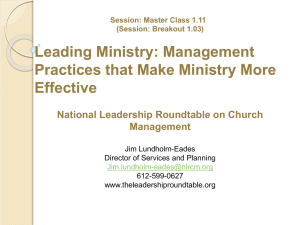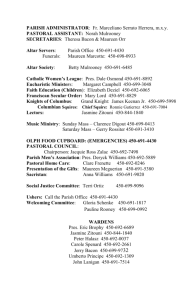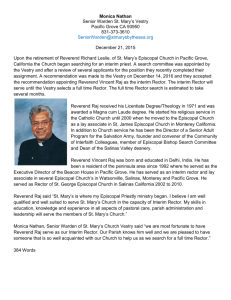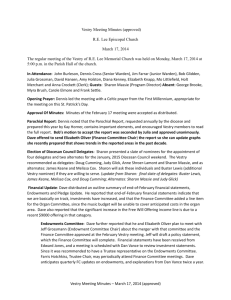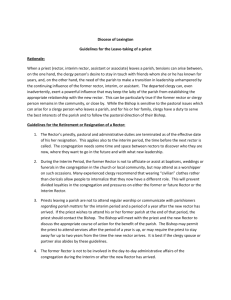Closure
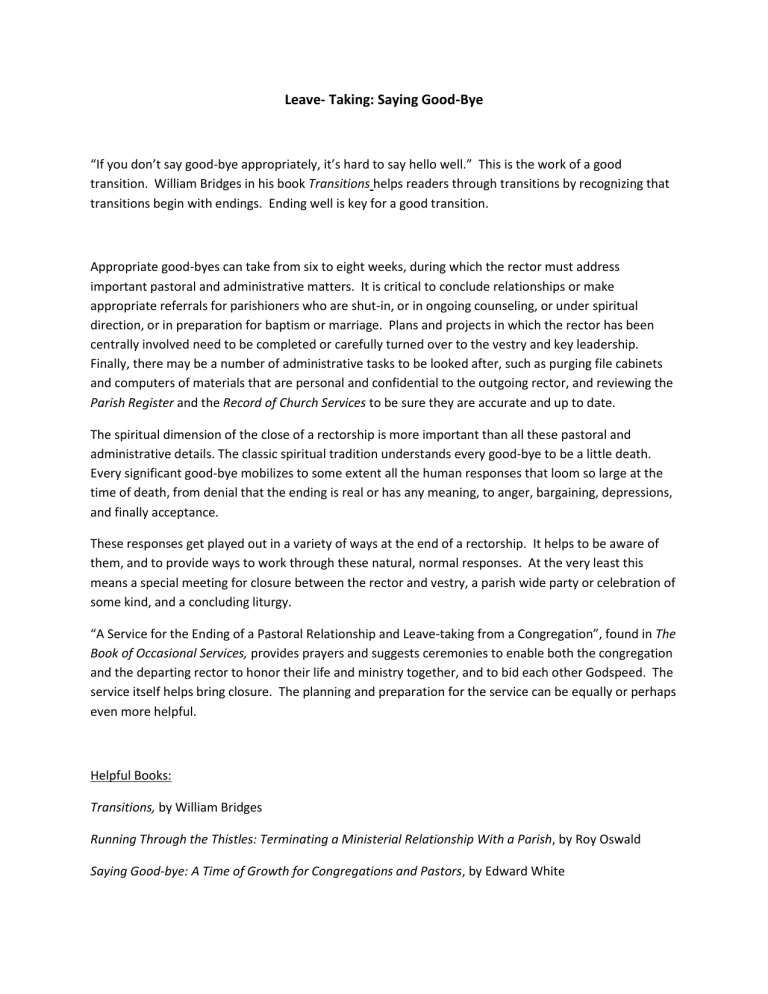
Leave- Taking: Saying Good-Bye
“If you don’t say good-bye appropriately, it’s hard to say hello well.” This is the work of a good transition. William Bridges in his book Transitions helps readers through transitions by recognizing that transitions begin with endings. Ending well is key for a good transition.
Appropriate good-byes can take from six to eight weeks, during which the rector must address important pastoral and administrative matters. It is critical to conclude relationships or make appropriate referrals for parishioners who are shut-in, or in ongoing counseling, or under spiritual direction, or in preparation for baptism or marriage. Plans and projects in which the rector has been centrally involved need to be completed or carefully turned over to the vestry and key leadership.
Finally, there may be a number of administrative tasks to be looked after, such as purging file cabinets and computers of materials that are personal and confidential to the outgoing rector, and reviewing the
Parish Register and the Record of Church Services to be sure they are accurate and up to date.
The spiritual dimension of the close of a rectorship is more important than all these pastoral and administrative details. The classic spiritual tradition understands every good-bye to be a little death.
Every significant good-bye mobilizes to some extent all the human responses that loom so large at the time of death, from denial that the ending is real or has any meaning, to anger, bargaining, depressions, and finally acceptance.
These responses get played out in a variety of ways at the end of a rectorship. It helps to be aware of them, and to provide ways to work through these natural, normal responses. At the very least this means a special meeting for closure between the rector and vestry, a parish wide party or celebration of some kind, and a concluding liturgy.
“A Service for the Ending of a Pastoral Relationship and Leave-taking from a Congregation”, found in The
Book of Occasional Services, provides prayers and suggests ceremonies to enable both the congregation and the departing rector to honor their life and ministry together, and to bid each other Godspeed. The service itself helps bring closure. The planning and preparation for the service can be equally or perhaps even more helpful.
Helpful Books:
Transitions, by William Bridges
Running Through the Thistles: Terminating a Ministerial Relationship With a Parish, by Roy Oswald
Saying Good-bye: A Time of Growth for Congregations and Pastors, by Edward White
Exit Interviews
The departing rector has a unique perspective on the congregation. Some form of exit interview, therefore will help all parties to gain closure on that rectorship. It is an exercise in good stewardship.
It serves the good order of the church if the departing rector meets separately with the Bishop, the wardens, the staff, and the vestry. In each of these meetings, the rector should be encouraged to reflect on both achievements and shortcomings, satisfactions and frustrations in the ministry that is coming to a close.
These meetings are for speaking the truth in love; sometimes only the certainty of the close of a relationship enables that kind of truth telling. The exit interview with the Bishop and with the wardens and other clergy staff may also be the occasion for conveying confidential information, particularly on matters of ongoing pastoral concern.
Some helpful things to cover in exit interviews are:
What are the parish’s mission statement and current goals?
What do you think are the current parish strengths, and current weaknesses that require special attention?
What special parish history do we need to know about?
What is the current financial condition of the parish?
Describe parish staff along with any particular issues affecting their employment, tenure, and performance.
Which lay persons are good leaders, good at follow though, and mature in their faith and practice?
Which parishioners need special attention?
Provide contact information for individuals and families who will need pastoral attention during the first few weeks of the interim, shut-in, or those who are sick.
Describe your pastoral routines, weekly, monthly, which will need to be covered.
Provide parish policies regarding baptisms, weddings, funerals, building use, etc.
Provide any particular liturgical practices unique to the parish.
What ecumenical and community relationships need to be maintained?
What two things might be done during the interim to strengthen this parish?
What are two things you fear might be lost, or might lose momentum during the interim?
Resignation Checklist for Rectors
Before accepting another call, discuss with the Bishop your intention to resign. Next notify the wardens, the vestry, staff, the vestry of your new cure, and then your present congregation.
Then:
Ask the wardens to arrange with the Office of the Bishop for a meeting with the vestry to discuss the options for the search process.
Transfer leadership responsibilities to continuing parish leadership, letting go of groups and agendas.
Develop your closure plan including exit interview, strategy for resolving pastoral relationships, date of final worship service, etc.
Clarify with wardens what leave time remains unused, and how that will figure in the final settlement and arrangements for continuity with the Church Pension Fund and other insurance coverages.
Balance the Rector’s Discretionary Fund and turn it over to the wardens.
Clear out personal files. Keep what you need, see that the parish has records of it, and properly dispose of the rest.
Review primary records to assure they are up to date and in good order: Mailing list, audits,
Parochial Reports, Register of Church Services, Parish Register, etc. Turn over records to the wardens.
Arrange for changes of address notices, phone forwarding, etc.
Arrange to care for outstanding personal debts if applicable.
Notify community groups and organizations of your departure.


